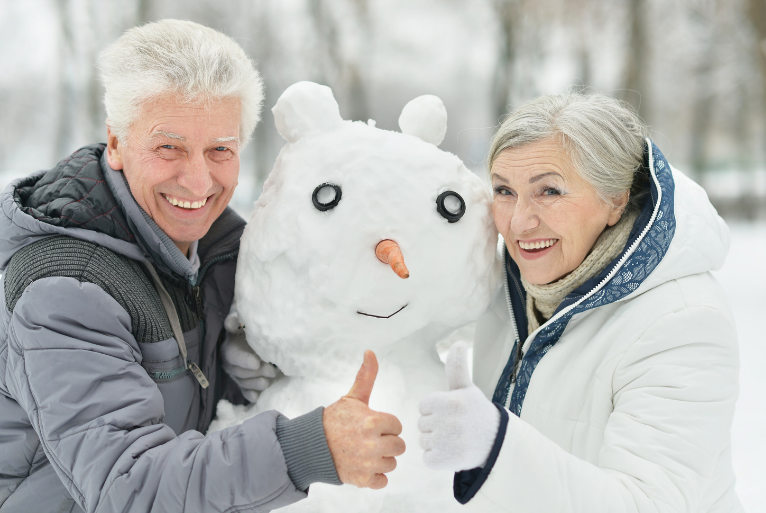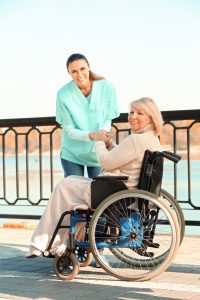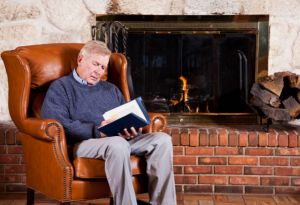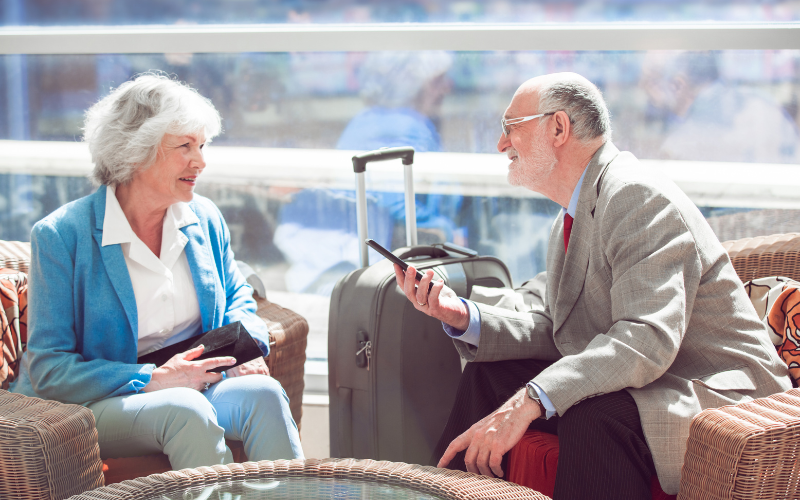
Warmth is essential during the frigid chills of winter. Aging adults, however, tend to lose body heat faster than when they were younger. They may also fail to realize when they are cold. Families who help their elderly loved ones stay warm in winter will prevent serious conditions, like hypothermia.
How do aging bodies react to the cold?
Due to the fact that aging skin is thinner, seniors are less able to tolerate the fluctuating temperatures of winter. The heart pumps less blood to the skin when the senior’s body becomes cold. When an older adult is subject to intense cold, the heart becomes stressed.
 Older adults are less able to withstand colder temperatures than their younger counterparts. A healthy baseline body temperature for people is 98.6 degrees Fahrenheit. If the senior’s body temperature drops below this, a series of dangerous health issues can emerge.
Older adults are less able to withstand colder temperatures than their younger counterparts. A healthy baseline body temperature for people is 98.6 degrees Fahrenheit. If the senior’s body temperature drops below this, a series of dangerous health issues can emerge.
Hypothermia, for instance, can develop when the senior’s body temperature dips to below 95 degrees Fahrenheit. Untreated hypothermia can cause the heart and respiratory systems to shut down; this can lead to death. Liver damage, heart attack, or increased blood pressure can also result.
Cold-related deaths are most common in the older population. Seniors with cognitive impairment are at greatest risk since they may experience confusion and be unaware of their low body temperature. Consequently, families and caregivers must shield seniors from the winter cold.
How do seniors stay warm indoors?
Lowering the thermostat in winter may be tempting, considering the savings in energy costs. Families and in-home caregivers, however, should set the indoor temperatures to between 68- and 70-degrees Fahrenheit. Anything lower is dangerous to seniors, especially in a home that is poorly insulated.
If the home lacks adequate insulation, now is the time to insulate drafty doors and windows. Caulk the windows and weather strip the doors. The doors to rooms that are seldom used should be kept closed; similarly, shut the heating vents in rooms that remain unoccupied.
 Space heaters, electric blankets, and fireplaces may introduce warmth to the home. Seniors who use warming devices should take extra precautions. Using electric blankets at night is not recommended, since adjusting the temperature can be problematic. Instead, pile on wool or down blankets.
Space heaters, electric blankets, and fireplaces may introduce warmth to the home. Seniors who use warming devices should take extra precautions. Using electric blankets at night is not recommended, since adjusting the temperature can be problematic. Instead, pile on wool or down blankets.
If using space heaters, keep them at least three feet away from curtains, bedding, and other flammable materials. Use a space heater built with a timer, in the event turning it off is forgotten. Tuck the space heater’s electrical cords against the wall to prevent trip hazards.
Caregivers should dress the senior in layers of clothing. Layers can be easily removed when it gets too hot. Older adults should wear socks and slippers inside the home to keep warm. Placing a blanket over the senior’s legs is another way to preserve body heat and essential warmth.
Prepare nutritious meals for seniors, especially those who are unable to cook for themselves. Foods that are rich in vitamins and minerals fuel the senior’s bodily heat and energy sources. In winter, serve hearty dishes, like casseroles, roasted vegetables, and chicken soups.
While eating regular meals stimulates the aging person’s bodily thermostat, staying hydrated is equally important. The dry indoor and outdoor temperatures of winter can cause dehydration. Water and juices are recommended. Avoid serving alcoholic beverages, as they can cause heat loss.
Seniors also become more vulnerable to flu in the cold season, read How to Protect Seniors from the Flu to prevent illness in your elderly this winter.
How do seniors stay warm outdoors?
Trips to the doctor’s office will be necessary, even in winter. Bundle up the senior in a winter coat, hat, gloves, and scarf. Most heat escapes from an uncovered head, so a hat is critical. Dress the senior in winter boots, too, as heat is easily lost through the extremities.
A waterproof coat is recommended on snowy days. If the senior’s coat or clothes become damp, change them into dry ones immediately. Snow, wind, and rain are known to increase heat loss. As a preventative safety measure, caregivers should check the weather forecast before heading outdoors with the senior.
What are the signs of hypothermia?
Family caregivers should be on the lookout for symptoms of hypothermia during the winter months. Warning signs of hypothermia should prompt an immediate call to 911. Early symptoms include pale skin, swollen face, slurred words, anger and confusion, and cold feet and hands.
As hypothermia advances, the senior can experience more severe symptoms. Later signs of hypothermia include having trouble walking, moving slowly, or becoming clumsy. A slow heartbeat and shallow breathing can occur. The senior may even black out or lose consciousness.
Seniors who are unable to pay the heating bills will find help from the National Energy Assistance Referral service, which can provide information about the Low-Income Home Energy Assistance Program. Help with weatherizing the home can be found by calling the local gas company.
Aging people will also receive help with dressing in layers and eating nutritiously from the professional caregivers at Assisting Hands Home Care. Our elderly sitters are qualified to oversee the senior’s physical and emotional well-being during the winter and all other seasons.
Typical caregiving responsibilities include helping the senior bathe and dress. We make sure the senior dresses in warm layers in the winter months. Caregivers support seniors with transfer assistance, such as moving into and out of a bed or chair, and provide discreet incontinence care.
Our meal preparation services keep the senior’s body fueled with the nutrients necessary to stay warm in winter. We shop for groceries, too. The senior’s home stays clean with our light housekeeping services. Assisting Hands Home Care providers are excellent companions and prevent loneliness.
Assisting Hands Home Care offers a range of elder care options. Included in our home care services are respite care, Alzheimer’s care, hospice care, and live-in care, among others. Families benefit from our flexible care options. Caregivers are available to meet various scheduling needs.
Families with seniors living in Matteson, Mokena, Frankfort, Bourbonnais, Crete, Lansing, and surrounding areas in Illinois, are urged to call Assisting Hands Home Care for compassionate home care. Your elderly loved one will have the opportunity to age in place in the comfort of home. Schedule an in-home consultation to get started on quality senior care. Call us at (708) 880-7711 today.
















